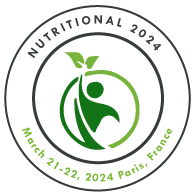Renowned Speakers

Steven M Donn
University of Michigan, United States USA

Kate Tauber
Albany Medical Center, United States USA

Dimitrios Angelis
University of Texas, United States USA

Renee J Dufault
Food Ingredient and Health Research Institute, United States USA

Heather Hanna
Imperial College, London, United Kingdom USA

Muhammad Pradhika Mapindra
Elizabeth Garrett Anderson Institute for Women’s Health, United Kingdom UK

Pei Chen Tsao
Taipei Veterans General Hospital, Taiwan Japan
Recommended Global Pediatrics Webinars & Conferences
Europe & UK
Asia Pacific & Middle East
Canada
Nutritional 2024
- Welcome Message
- Session track
- Why to Attend?
- Who should attend?
- Major Associations and Societies Worldwide
- Market Analysis
Welcome Message
Research on Paediatrics and Nutrition. At Nutritional Conference 2024, connect with the influential global audience, discover their interests through conferences, and work together to create collaborations. We are pleased to extend an invitation to you to take part in the “40th International Conference on Paediatric and Nutritional Research”, which will be held in Paris, France, March 21–22, 2024. “Exploring the crucial function of nutrition in early infant development” is the theme of the conference.
The 2024 edition of Paediatric and Nutritional Conference Research will examine current trends and fresh efforts that can be applied to research and breakthroughs in the field of pediatrics and nutrition. The relevance can be evaluated by the fact that it has made significant progress through time and is still having an impact on different industries. Through presentations, educational workshop sessions, and important presentations, Infancy 2024 is managed with regard to its impact on Paediatric research and outcomes. The resources will be provided to viewers to support paediatric Conference and nutrition education, providing a forum for the exchange of knowledge and the sharing of problems.
Session track
Track 1: Paediatric and Neonatal Nutrition
Paediatric nutrition is the maintenance of an appropriate, well-balanced diet that includes the necessary nutrients and calorie intake to support physiologic requirements at different stages of a child's development and to encourage growth. Paediatric dietary requirements are closely tied to development rate and vary greatly with age, degree of activity, and environmental factors. Breastfeeding contains vital nutrients that aren't included in any infant formula and help the child's immune system develop.
Track 2: Paediatric Diet
The diet helps children develop healthy eating habits and provides appropriate nourishment for children of all developmental ages. These are based on the fundamental food groups and take age-specific Recommended Dietary Allowances (RDA) into account. Between-meal snacks may be included in food group proportions. One-year-olds start to exhibit a decline in appetite and interest in food, which is normal for their age and coincides with a slowing of growth. This decline in appetite and interest in food should not be construed as "poor" appetite.
Track 3: Breast Feeding
For an infant, breastfeeding has several advantages. Breast milk has the ideal ratio of nutrients to support a baby's growth and development. Some of the nutrients in breast milk also aid in defending infants against some infections and diseases that are common in young children. Mother's health may also benefit from it. Breastfeeding mothers may experience fewer cases of some cancers than other mothers. Try to breastfeed your child during the first six months of life if you don't have any health difficulties.
Track 4: Neonatal Intensive & Critical Care
Some issues associated with premature birth are more dangerous than others, and they might differ amongst premature babies. The primary factor in approximately 1 million fatalities in children under the age of five in 2013 was complications from preterm birth. All medical professionals who assist with childbirth must be proficient in neonatal resuscitation techniques. To prevent neonatal problems, clinicians must employ the most up-to-date non-pharmacologic and pharmaceutical therapy for the successful management of infant pain, distress, or agitation.
Track 5: Paediatric and Neonatal Gastroenterology
Some preterm infants may experience more severe difficulties from birth than others, and these complications can vary. In 2013, there were around 1 million deaths related to preterm birth problems, which is the leading cause of mortality in children under the age of five. For all healthcare professionals engaged in the delivery of new-born, knowledge of neonatal resuscitation is crucial. To effectively manage infant pain, distress, or agitation and prevent neonatal problems, clinicians must use the most recent non-pharmacologic and pharmaceutical therapy.
Track 6: Clinical Paediatric Gastrointestinal Disease & Diagnosis
The gastrointestinal tract (GIT) arises initially during the process of gastrulation from the endoderm of the trilaminar embryo (week 3) and extends from the buccopharyngeal membrane to the cloacal membrane. The tract and associated organs later have contributions from all the germ cell layers. Digestion is the breakdown of food into smaller particles or individual nutrients.
Track 7: Paediatric Nutrition
Paediatric nutrition is the maintenance of a proper well-balanced diet consisting of the essential nutrients and the adequate caloric intake necessary to promote growth and sustain the physiologic requirements at the various stages of a child's development. Paediatric nutritional needs vary considerably with age, level of activity, and environmental conditions and they are directly related to the rate of growth.
Track 8: Paediatric Gastrointestinal Cancer
Surgeons continue their efforts to improve their techniques to operate colorectal cancers. They now have a better understanding of what makes colorectal surgery more likely to be successful, such as making sure enough lymph nodes are removed during the operation. Oesophageal cancer usually begins in the cells that line the inside of the oesophagus. Pancreatic cancer begins in the tissues of your pancreas an organ in your abdomen that lies horizontally behind the lower part of your stomach.
Track 9: Paediatric Gastrointestinal Surgery
Intussusception is the most common abdominal emergency affecting children under 2 years old. It happens when one portion of the bowel slides into the next, much like the pieces of a telescope. A hydrocele is a collection of fluid within the Processes vaginalis (PV) that produces swelling in the inguinal region or scrotum. An inguinal hernia occurs when abdominal organs protrude into the inguinal canal or scrotum.
Track 10: Child Development & Stages
Understanding child development is essential because it allows us to completely appreciate the cognitive, emotional, physical, social, and educational growth that children go through from birth to their early adulthood. There are five areas of child development: physical, social and emotional, approaches to learning, thinking, and communication and language.
Track 11: Issues in Child Development and Care
Children during early years of age undergo rapid growth and development that is greatly influenced by certain factors. Exclusive breastfeeding, adequate complementary feeding, stimulation, safe environment and care need to be ensured for optimum physical, mental, social and cognitive development. Children who have a good start in their life will be healthier adults resulting better life promoting Gross National Happiness.
Track 12: Child Developmental & Behavioural Disorders
Young children can be naughty, defiant and impulsive from time to time, which is very normal. However, some children have extremely difficult and challenging behaviours that are outside the boundary for their age. The most common disruptive behaviour disorders include oppositional defiant disorder (ODD), conduct disorder (CD) and attention deficit hyperactivity disorder (ADHD).
Track 13: Paediatric Hepatology
Hepatology is a branch of medicine concerned with the study, prevention, diagnosis and management of diseases that affect the liver, gallbladder, biliary tree and pancreas. The term is derived from the Greek words hepatikos and logia, which mean liver and study. Wilson's disease or hepatolenticular degeneration is an autosomal recessive genetic disorder in which copper accumulates in tissues.
Track 14: Paediatrics Case Reports
A Case Report is a detailed report of the symptoms, signs, diagnosis, treatment, and follow-up of an individual patient. Case reports contain a demographic profile of the patient and usually describes an unusual or novel occurrence. Some case reports also contain a literature review of other reported cases. The session includes discussion on Paediatric Gastroenterology, Neonatal Gastroenterology, Paediatric Gastrointestinal disorders, Paediatric hepatology, Paediatric Nutrition and Paediatric Surgery.
Track 15: Paediatric Cardiology
The study of Paediatric Cardiology is responsible for the diagnosis of congenital heart defects, performing diagnostic procedures such as echocardiograms, cardiac catheterizations and electrophysiology studies. The increasing number of neonates with congenital heart defects referred to the neonatal intensive care unit reflects the increasing awareness that the defects may be present. Chest radiography and ECG rarely assist in the neonatal diagnosis. Congestive heart failure in the foetus.
Track 16: Paediatric Neurology
Researchers are engaged in a variety of laboratory and clinical research programs to extend their understanding of the developing nervous system and pathologic processes that underlie neurological disorders in children. The most common neurological disease is paediatric epilepsy. Approximately 70% of children who suffer epilepsy during their childhood eventually outgrow it. Magnetic resonance spectroscopy (MRS) is a diagnostic tool used for inherited metabolic disorders.
Track 17: Paediatric Endocrinology
Paediatric Endocrinology is a medical subspecialty dealing growth disorders and sexual differentiation in childhood, as well as neonatal diabetes and other disorders of the endocrine glands. It also includes the study of the most common types of diabetes are type 1 and type 2 diabetes. There is another type of diabetes that is often misdiagnosed as type 1 or type 2 diabetes, called monogenic diabetes which is seen in children.
Track 18: Paediatric Gastroenterology
Gastrointestinal disorders in children range from minor to life threatening, and short- to long-term or chronic. Neonatal Jaundice is one of the most common conditions needing medical attention in new-born babies. Gastrointestinal food allergies are not rare in infants and children. Gastrointestinal (GI) endoscopic procedure a paediatric endoscopy has become an essential modality for evaluation and treatment of GI diseases.
Track19: Paediatric Psychology
Nearly every child or teen faces some challenges as they grow up because of peer pressure, family changes, a death or other loss, managing a chronic illness, or simply because it isn’t easy making the change from being a child to being an adult. Poor mental health can affect overall well-being and can lead to emotional and behavioural changes, ADHD and learning disabilities. Many children experience loss or stress, and others must manage their chronic illness at a young age.
Track 20: Paediatric Allergy & Infectious Diseases
Paediatric Allergy is an important subject to be learnt in order to promote understanding and advance the treatment of respiratory, allergic, and immunologic diseases in children. It emphasizes the epidemiologic research on the most common chronic illnesses of children—asthma and allergies—as well as many less common and rare diseases. Swollen or enlarged adenoids and Tonsils are common in children
Track 21: Veterinary Pharmacology and Therapeutics
Veterinary Pharmacology and Therapeutics is a field of study within veterinary medicine that focuses on the use of medications and therapeutic interventions to diagnose, treat, and manage various medical conditions in animals. It involves understanding the pharmacological properties of drugs, their mechanisms of action, appropriate dosing, and potential interactions or adverse effects.
Why to Attend?
Pediatric conference offers a special networking and collaboration opportunity to market your products and increase the credibility of your brand. It provides cutting-edge research analysis in a cozy setting where attendees and exhibitors enjoy individualized customer service. There will be a lot of foot traffic and ample recognition for sponsors and exhibitors.
Don’t miss your chance to:
- Network.
- Build complete Awareness.
- Make a protracted time impact on your target market.
- Find new customers Stay on high of business trends.
- Capture immediate feedback on new technologies, services, or merchandise
- Gain business insight and appraise market trends to come up with new business opportunities.
- Access relationships with contacts WHO might not be a part of your current market or promoting strategy.
Who should attend?
-
Scientists.
-
Doctors.
-
Professors.
-
Paediatricians.
-
Medical care Professionals and Doctors.
-
Pediatric Dieticians ,Infant care specialist.
-
Clinical Nutritionists.
-
Pediatric Researchers.
-
Pediatric Surgeons.
-
Pediatric Nutritionists.
-
Health-Care Professionals.
-
Pediatric Nurses.
-
Pediatric Physicians.
-
Pediatric Cardiologists.
-
Pediatric Gastroenterologists.
-
Department of Nutrition and Dieticians.
-
Nutrition and Food science Associates.
-
Business Entrepreneurs.
-
Pharmaceutical companies.
Major Associations and Societies Worldwide
-
Academic Pediatric Association
-
American Pediatric Society
-
American Pediatric Surgical Nurses Association
-
Association of Surgeons of the Netherlands
-
American Academy of Pediatrics
-
American Society of Pediatrics Haematology/Oncology
-
Canadian Pediatric Association
-
European Paediatric Surgeons’ Association (EUPSA)
-
European Society for Paediatric Infectious Diseases (ESPID)
-
European Society for Pediatric Neurosurgery (ESPN)
-
European Paediatric and Congenital Cardiology (AEPC)
-
European society for Pediatric Urology
-
European Society for Paediatric Radiology-ESPR
-
European Society for Pediatric Gastroenterology
-
European Paediatric Dentistry Societies and Associations
-
European Pediatric Association
-
European & Worldwide Associations –EADV
-
Indian Association of Pediatric Surgeons
-
International Association of Endocrine Surgeons
-
International Pediatric Association
-
Indian Academy of Pediatrics
-
International Society for Heart & Lung Transplantation–ISHLT
-
International Pediatric Simulation Society– (IPSS)
-
OPEN Pediatrics Community European Society for Paediatric Research (ESPR)
-
Society of Developmental and Behavioural Pediatrics
-
The Asia-Pacific Pediatric Association
-
The International Society for Pediatric Innovation (ISPI)
-
World Society for Pediatric Infectious Diseases (Netherlands)
-
World Federation of Pediatric Imaging (AfSPI)
-
Worldwide Pediatric Cardiovascular Services – WSPCHS
-
Worldwide Dermatology Societies-DermNet NZ
Market Analysis
A million newborns die each year from problems associated with preterm delivery, according to estimates made by the WHO in recent years. Pediatrics is a market that is constantly evaluated, along with infant mortality, death rates, and consequently disease rates, as well as the manufacture and consumption of vaccinations for child care.
The pediatric nutrition and healthcare industries have substantial challenges with regard to Medicare funding. The cost of therapy for children who need hospitalization or specialized care increases significantly, despite the fact that many children's healthcare costs are fairly inexpensive. Additionally, with a focus on preventative health, pediatrics needs greater money. Although children make up about 60% of conscripts, only about 20% of Medicare cash goes into funding them. Additionally, there has been a significant increase in baby care and fontal equipment across the globe over the years to lessen the challenges associated with newborns who were delivered prematurely. Furthermore, the survival rate of these sick patients has recently increased noticeably. Delay in pregnancy, artificial insemination, and inadequate parental care are the main causes of premature birth. Pediatric disorders are accepted more readily as a result of changes in child care. The primary focus is on lowering the risk and complications associated with infants in order to shorten hospital stays and lower hospital expenses.
To Collaborate Scientific Professionals around the World
Conference Date March 21-22, 2024
For Sponsors & Exhibitors
Speaker Opportunity
Useful Links
Past Conference Report
Supported By
All accepted abstracts will be published in respective Conference Series International Journals.
Abstracts will be provided with Digital Object Identifier by




